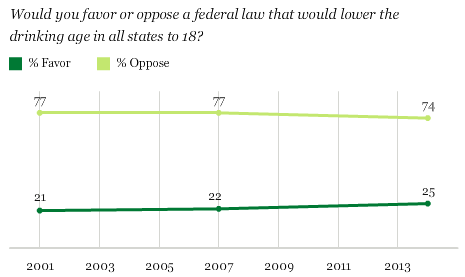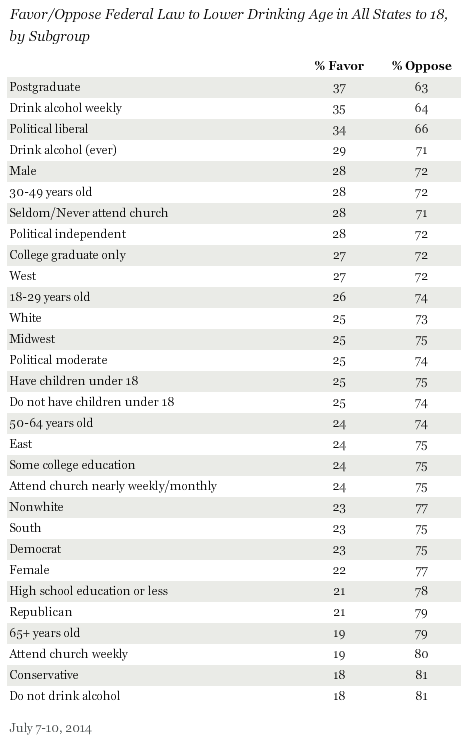PRINCETON, NJ -- Thirty years after federal legislation established 21 as a uniform minimum age to drink alcohol in all states, Americans are widely opposed to lowering the legal drinking age to 18. Seventy-four percent say they would oppose such legislation, while 25% would favor it. The level of opposition is similar to what Gallup has measured in the past.

In 1984, President Ronald Reagan signed into law a bill that withheld a portion of federal highway funds from states that did not have a minimum drinking age of 21. A Gallup Poll conducted weeks before Reagan signed the law found Americans widely favored raising the drinking age to 21, by 79% to 18%.
One of the major aims of the 1984 law was to reduce the amount of driving fatalities involving young adults. That was especially a concern when neighboring states had different minimum drinking ages. Those those old enough to drive, but not old enough to drink in their own state, would drive to a neighboring state with a lower drinking age to purchase or consume alcohol. Research shows the 1984 law did help reduce vehicle fatalities involving alcohol, particularly among young adults.
Despite the progress made in reducing traffic deaths involving alcohol, drunk driving remains a factor in many automobile fatalities. Also, one of the major concerns with alcohol today is binge drinking among young adults, and it is not clear that having a higher drinking age helps in that regard. Rather, some experts suggest lowering the drinking age, and teaching teens and young adults to drink responsibly at a younger age, would help to reduce the allure of alcohol to those forbidden by law to possess it.
But Americans are either not aware of or not persuaded by such arguments, given that public support for a minimum drinking age of 21 seems pretty solid and consistent over the past three decades.
Liberals, Drinkers Least Likely to Oppose Lower Drinking Age
All major subgroups are opposed to lowering the drinking age. Political ideology is one of the major dividing lines on the issue, with liberals (34%) among the most supportive of lowering the drinking age and conservatives (18%) among the least supportive subgroups. There are only minor differences by political party.
Another major predictor of support for lowering the drinking age is whether one personally drinks alcohol. Twenty-nine percent of those who drink alcohol at least on occasion favor lowering the drinking age compared with 18% who never drink. Support is even higher among those who drink regularly -- on a weekly basis -- at 35%.
Also, support for lowering the drinking age tends to be higher among those who have higher levels of education, with 37% of those with a postgraduate degree supporting such a change in the law.

Although younger adults in the current poll are no more likely to favor lowering the drinking age than their older counterparts, Gallup has found this relationship in past surveys in 2001 and 2007.
Implications
It is widely known that underage drinking remains common in the U.S., despite the uniform minimum drinking age of 21 in all states. One proposed solution to the problem is to lower the drinking age to 18. Although such a move could be seen as giving in to law-breaking, it may also encourage those under 21 who drink to do so in public settings where their alcohol intake can be better monitored.
The United States' minimum age of 21 is higher than in nearly every other country. Further, there are questions about why those under 21 cannot legally drink alcohol when they are permitted to drive, vote, and serve in the military. In fact, that was the rationale that led many states to lower the drinking age to below 21 in the 1970s. Of course, those changes in the law created their own set of problems with drunk driving, although that may have been partly a result of the lack of uniformity in state drinking laws as well as irresponsible drinking by those between the ages of 18 and 20.
In any case, the public is widely opposed to lowering the drinking age, and has been for some time. Thus, any proposed legislation to legalize drinking at the age of 18 is unlikely to succeed unless Americans' attitudes on the proper minimum drinking change. Even change in public attitudes alone may not be enough to change the law, as tying federal highway funds to a minimum drinking age of 21 is an incentive for states to leave their laws unchanged.
Survey Methods
Results for this Gallup poll are based on telephone interviews conducted July 7-10, 2014, with a random sample of 1,013 adults, aged 18 and older, living in all 50 U.S. states and the District of Columbia.
For results based on the total sample of national adults, the margin of sampling error is ±4 percentage points at the 95% confidence level.
Interviews are conducted with respondents on landline telephones and cellular phones, with interviews conducted in Spanish for respondents who are primarily Spanish-speaking. Each sample of national adults includes a minimum quota of 50% cellphone respondents and 50% landline respondents, with additional minimum quotas by time zone within region. Landline and cellular telephone numbers are selected using random-digit-dial methods. Landline respondents are chosen at random within each household on the basis of which member had the most recent birthday.
Samples are weighted to correct for unequal selection probability, nonresponse, and double coverage of landline and cell users in the two sampling frames. They are also weighted to match the national demographics of gender, age, race, Hispanic ethnicity, education, region, population density, and phone status (cellphone only/landline only/both, and cellphone mostly). Demographic weighting targets are based on the most recent Current Population Survey figures for the aged 18 and older U.S. population. Phone status targets are based on the most recent National Health Interview Survey. Population density targets are based on the most recent U.S. census. All reported margins of sampling error include the computed design effects for weighting.
In addition to sampling error, question wording and practical difficulties in conducting surveys can introduce error or bias into the findings of public opinion polls.
View survey methodology, complete question responses, and trends.
For more details on Gallup's polling methodology, visit www.gallup.com.
